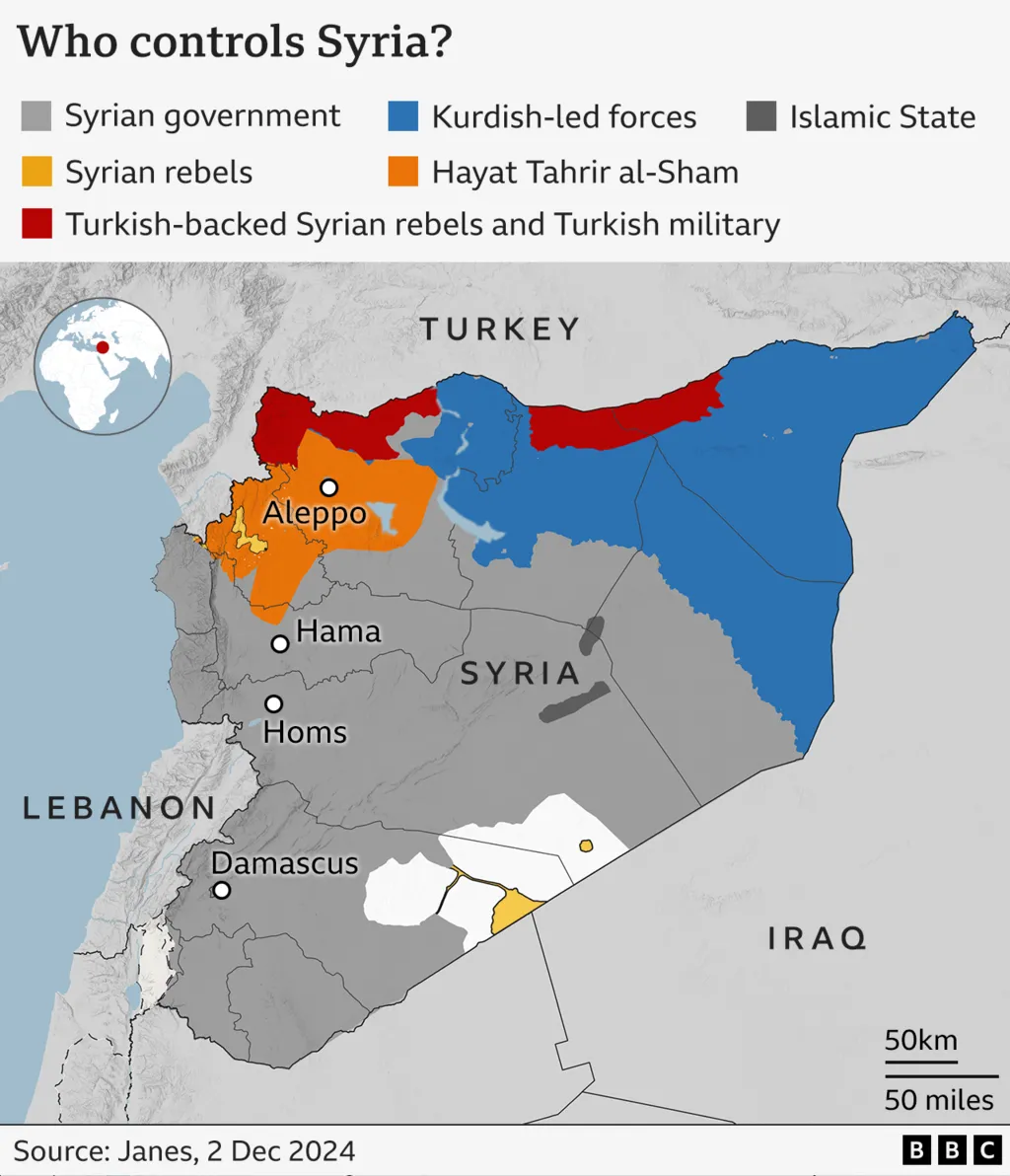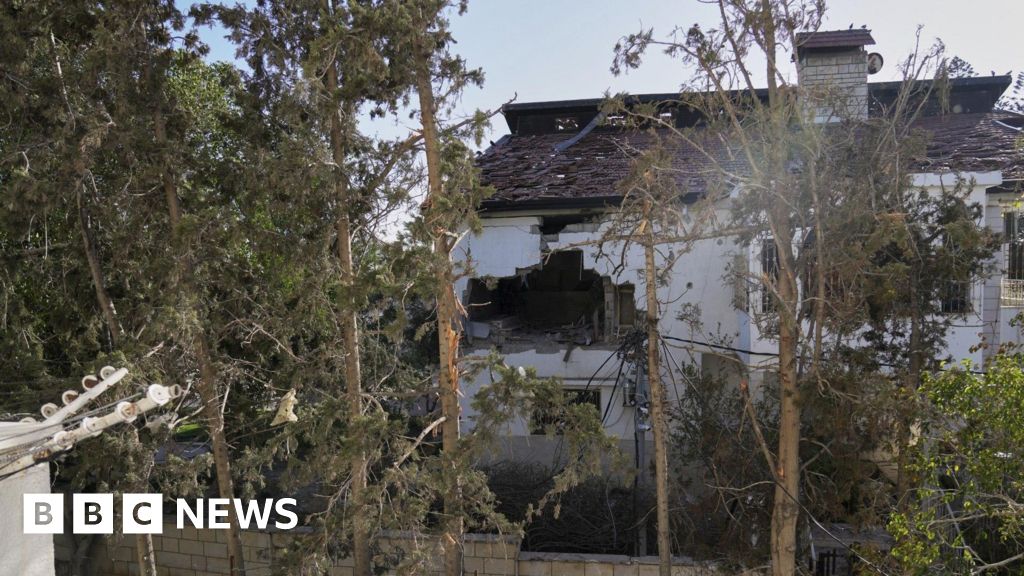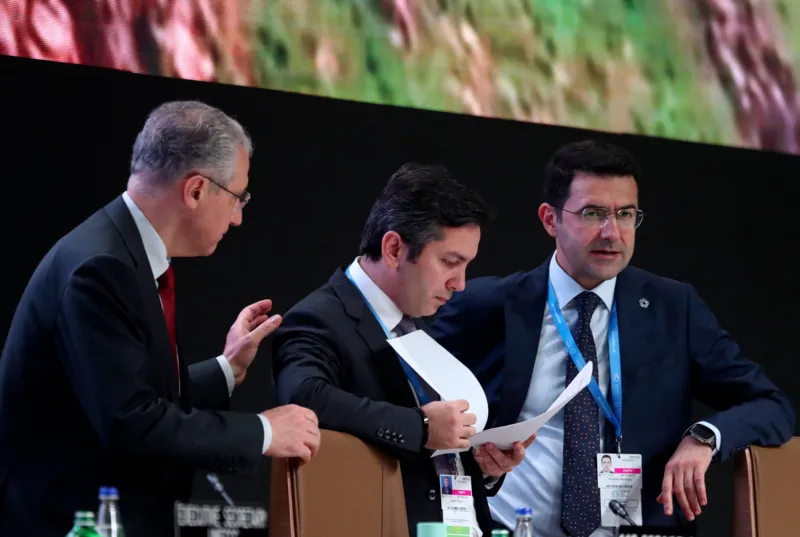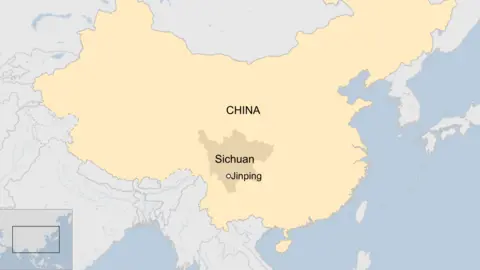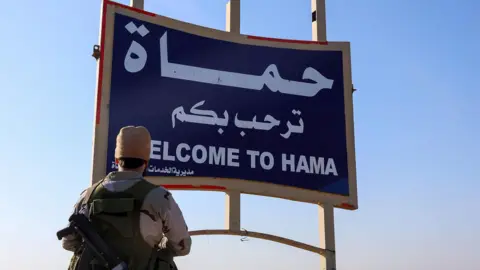 EPA
EPASyrian President Bashar al-Assad’s forces are reportedly engaged in fierce battles with rebels on the outskirts of the major city of Hama.
A monitoring group said on Tuesday evening that the Islamist militant group Hayat Tahrir al-Sham and its allies were “at the gates of Hama”, but on Wednesday it said the military had retaken several villages in a counter-attack backed by intense air strikes.
Syrian state media also said troops had pushed back the rebels north of the city, but the rebels denied losing any ground there.
Hama is 110km (70 miles) south of Aleppo, which the rebels captured last week after launching a surprise offensive from their stronghold in the north-west.
The state-run Sana news agency and the Syrian Observatory for Human Rights (SOHR), a UK-based monitoring group, both reported intense fighting on Wednesday morning around Jabal Zain al-Abadin, a hill about 5km (3 miles) north-east of Hama.
The SOHR said the clashes came after government forces launched a counter-attack, during which they were able to push the rebels back almost 10km from the city and recapture two villages near the hill.
A spokesman for the rebel’s “Military Operations Division” accused the military of spreading rumours to raise the morale of its troops and insisted rebels were still in control of all locations they had recently taken.
An affiliated news channel meanwhile said that five more villages east of Hama had been captured, as well as a base of the 25th Special Mission Forces Division.
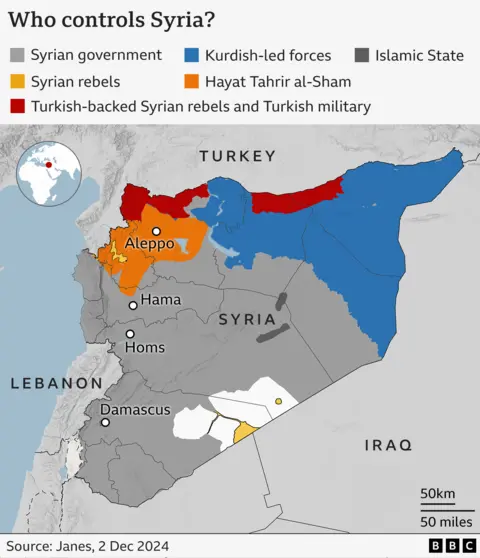
On Tuesday, the SOHR reported that there had been “major displacement” from Hama, which is home to about 1 million people, after the rebels reached the city’s outskirts and several civilians were injured by their shellfire.
Wassim, a delivery driver who lives in the city, told AFP news agency: “The sounds were really terrifying, and the continuous bombing could be clearly heard”.
But he added: “I’ll stay home because I have nowhere else to flee to.”
The SOHR has said that more than 600 people have been killed, including 107 civilians, and tens of thousands have been displaced since the start of the rebel offensive last Wednesday.
The United Nations has expressed alarm at the sudden escalation of Syria’s devastating, 13-year civil war and warned that the situation is “extremely fluid and dangerous”.
“If we do not see de-escalation and a rapid move to a serious political process, involving the Syrian parties and the key international players, then I fear we will see a deepening of the crisis,” special envoy Geir Pedersen told the UN Security Council on Tuesday.
“Syria will be in grave danger of further division, deterioration, and destruction.”
President Assad has vowed to “crush” the rebels and accused Western powers of trying to redraw the map of the region, while his key allies Russia and Iran have offered their “unconditional support”.
Russian warplanes have intensified their strikes on rebel-held areas in recent days, Iran-backed militias have sent fighters to reinforce the government’s defensive lines around Hama, and Iran has said it is ready to send additional forces to Syria if asked.
Turkey, which supports the Syrian opposition but has denied reports that it is involved in the HTS-led offensive, has urged Assad to engage in a political process with the opposition to bring an end to Syria’s 13-year civil war.
Turkish-backed rebel factions have meanwhile capitalised on the government’s retreat in the north by launching a separate offensive on a pocket of territory near Aleppo that was controlled by a Kurdish-led militia alliance, the Syrian Democratic Forces (SDF).
More than half a million people have been killed since the civil war erupted in 2011 after Assad’s government cracked down violently on peaceful pro-democracy protests.
Before the start of the rebel offensive, the government had regained control of Syria’s main cities with the help of Russia, Iran and Iran-backed militias. However, large parts of the country remained out of its control.
The rebels’ last stronghold was in Aleppo and Idlib provinces, which border Turkey and where more than four million people were living, many of them displaced from government-held areas.
The enclave was dominated by HTS, which is designated as a terrorist organisation by the UN, US, Turkey and other countries because it was al-Qaeda’s affiliate in Syria until it formally broke ties in 2016.
A number of allied rebel factions and jihadist groups were also based there, along with Turkish-backed SNA factions and Turkish forces.
In 2020, Turkey and Russia brokered a ceasefire to halt a push by the government to retake the region. That led to an extended lull in violence, but sporadic clashes, air strikes and shelling continued.
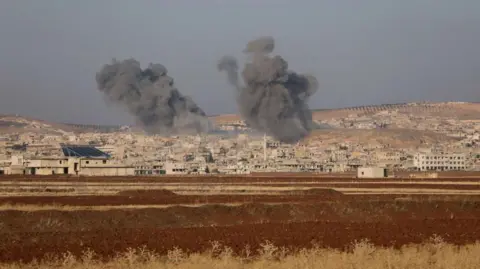 AFP
AFPHTS and its allies said last Wednesday that they had launched an offensive to “deter aggression”, accusing the government and allied Iran-backed militias of escalating attacks on civilians in the north-west.
But it came at a time when the government’s allies were preoccupied with other conflicts.
The Iran-backed Lebanese group Hezbollah, which was crucial in helping push back rebels in the early years of the war, has suffered recently from Israel’s offensive in Lebanon.
Israeli strikes have also eliminated Iranian military commanders in Syria and degraded supply lines to pro-government militias there.
Russia has also been also distracted by the war in Ukraine.
Mr Pedersen estimated that the rebels now had de facto control over territory containing an estimated 7 million people, including 2 million in Aleppo city.
